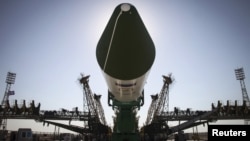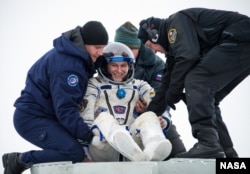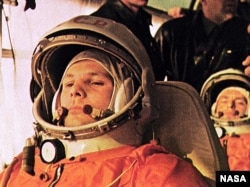Russia's President Vladimir Putin liquidated the Federal Space Agency, Roscosmos, on Monday — and replaced it with a state corporation, still called Roscosmos.
The plan, to take effect January 1, was decided a year ago following a series of embarrassing rocket failures and high-profile corruption.
Russia lost a defense satellite Dec. 5, 2015, when the satellite failed to separate from a Soyuz rocket.
A failed Russian Proton rocket launch in May resulted in the loss of a Mexican communications satellite. Another Soyuz rocket breakdown in April failed to deliver cargo supplies to the International Space Station.
Putin in October criticized officials for a months-long delay in building a new space center for rocket launches in Russia's Far East. The Vostochny Cosmodrome being built near the Chinese border would eliminate Russia's reliance on Kazakhstan's Soviet-era Baikonur launch pad, but the project has been plagued with corruption charges and delays in paying workers.
Tatyana Golikova, Russia's chief auditor, in May red-flagged the cosmodrome for ballooning construction costs. Golikova told the Russian parliament that Roscosmos was guilty of "financial violations" amounting to 92 billion rubles, or about $1.8 billion dollars in 2014.
'Getting a monopoly'
Deputy Prime Minister Dmitry Rogozin, in charge of Russia's defense and space industries, said the problem was management.
Roscosmos' new incarnation aims to improve management of Russia's space program by empowering it to have more control over its budget.
But some analysts are skeptical the change will make any positive difference.
"Russia, when it encounters a problem — and Roscosmos, indeed, has got a lot of problems — it always chooses a bureaucratic method and instead of one bureaucratic structure, they create another one, arranging a management shake-up," said Alexander Golts, a defense analyst and deputy editor at Ezhednevny Zhurnal. "But this shake-up only means a victory of one bureaucratic clan over the other. It doesn't mean that things in Roscosmos will improve."
Vadim Lukashevich, an independent aviation and aerospace expert, is even more critical of the new space entity.
"We are getting a monopoly, a closed state corporation that determines itself what to make, what state policy to adhere to, what projects to implement and at what cost," he said. "It's natural that there is no state or public control in such a setup. On the other hand, that's a huge area for possible abusive activities, corruption, mishandling of funds and so on."
Former point of pride
Russia's space program under the Soviet Union was a point of pride. The USSR launched the first artificial satellite, Sputnik, and put the first man, Yuri Gagarin, in space.
Officials, including Putin, have sought to revive the space program's lost glory.
But Golts says part of the challenge is that Russia inherited a complicated system of parts production for sophisticated technology.
"Unfortunately, after the fall of the USSR," Golts said, "we did not succeed in creating a normal system where all parties were interested in producing the parts for the military industrial complex. And that's why the crashes and accidents happen all the time."
Economic problems are also taking a toll. Low oil prices and sanctions over Ukraine are shrinking Russia's economy and the federal budget. Russian newspaper Izvestia reported this week that Roscosmos plans to cut spending on planned flights to the moon by $1.2 billion.
Rogozin denied the cuts would mean the elimination of the moon exploration program. But he acknowledged such programs would be curtailed to focus on unmanned flights in a decade or so.
In the meantime, he said, the new state corporation will focus on making space launches cheaper and better managed.






